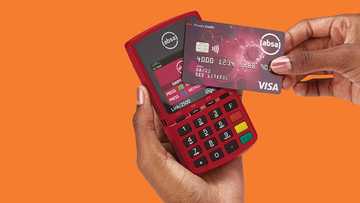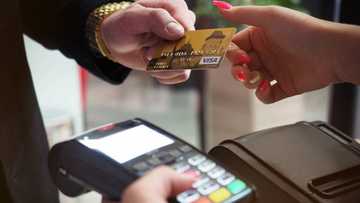South Africa bank charges and fees guide 2021 (Updated)
South Africa's banking sector is one of the most vibrant in the southern region of Africa. The financial institutions charge different amounts for various purposes. The bank charges differ depending on the nature of the transaction, amount of money transacted, and account type. The rates also vary from one financial institution to the other.

Source: UGC
It's imperative to understand all the fees your bank levies. With such an understanding, you can reduce the fees banks slash from your account every time you transact. This can be done by avoiding transactions with higher levies or going for a financial institution with lower rates. Here are the updated bank charges in South Africa.
Why do banks charge their customers?
Banks are businesses, and businesses are all motivated by profit. Most of the banks in South Africa are here to make a profit. To ensure that the venture is profitable, they charge for the services offered for the following reasons:
- To cover operational costs associated with running the banking system.
- To maintain sufficient liquidity within the banking system.
- For tax purposes.
- As part of risk management strategies.
What are the types of bank charges?
There are three main categories of bank fees – service fee, interest rate, taxes and foreign exchange conversion fee. All these charges apply to both savings and current accounts. However, there are some differences between them.
- Service fee - A service fee is charged when a customer makes transactions using their debit card at ATMs, point-of-sale terminals and so forth. This includes cash withdrawals, balance enquiries, transfers, bill payments, debits and credits.
- Interest rate - An interest rate is charged on loans taken out against deposits held with the bank. Banks usually offer different rates of interest-based on the duration of the loan and the borrower's creditworthiness.
- Foreign exchange conversion fees - This refers to the cost incurred when converting currencies into local currency.
- VAT on bank charges South Africa - Value Added Taxes are levied on some financial services. The VAT rate in South Africa is 15%
How much do bank charges cost?
The rates differ from one bank to the other. They also depend on several factors, including the size of the deposit, the number of transactions made, etc. Here is a breakdown of the updated fees to help you compare bank charges in South Africa:
1. Absa Bank

Source: Instagram
Absa Bank is one of the famous financial institutions in the country. People love it because of its wide range of products and services. Here is a glimpse of what the bank charges its customers:
Deposits
- Cash deposit on branch counter: Applies to more than R80.00; you will be charged R2.20 per R100
- Cash deposit at any Absa ATM: R2.20 per R100
- Cardless cash deposit on Cash acceptor: R2.20 per R100
Cash withdrawals
- Branch counter for R80.00 and above: R2.20 per R100
- Absa ATM: R8.00 per R1 000
- Point of Sale (POS): No charges
- Absa-supported ATM: R8.00 per R1 000
- Saswitch ATM/Post Office terminal for R12.00 and above: R2.20 per R100
- Overseas ATM/POS: R80.00
Absa immediate payment cost
- Absa ATM, POS, Online, Mobile, Telephone (IVR): R1.50
- Absa-supported ATM: R6.00
- Saswitch ATM: R12.00
- POS – local or overseas: No charge
- Lotto purchase via an Absa channel: R2.70
- Digital voucher via App: R1.00
Balance enquiries
- Branch counter: R9.00
- Absa ATM/Absa-supported ATM/POS: No charge
- Saswitch ATM/Post Office terminal/Overseas ATM: R9.00
- Online, Mobile, Telephone (IVR): No charge
- Telephone adviser-assisted: R9.00
2. First National Bank

Source: Twitter
First National Bank, popularly known as FNB, has been around for over a century. The financial institution offers various services like personal finance management, mortgages, corporate, and merchant banking. Here is a breakdown of FNB's easy account fees in 2021:
Account deposit and withdrawal fees
- Withdraw cash from any FNB ATM or FNB Slimline: R8 per R1000
- Withdraw money from non-FNB ATMs: R12 per R1000
- Deposit cash at FNB ATM: Free up to R1500 per month
- Cash Till: Free
- EFT payments: R1
Balance inquiry
- Using mobile and e-Channels: Free
- Point-of-Sale: R1.75
- Other financial institutions ATMs, or telephone banking: R7.30
Other fees
- Prepaid airtime or data purchase: Free
- Prepaid electricity and LOTTO/Powerball purchases: R2.70
- Reversal of incorrect Send Money to e-Wallet – telephone/branch: R55
- Declined transactions at point-of-sale, scheduled payment and other financial institution ATMs: R8.50
- Card replacement fee in branch: R120
3. Nedbank

Source: Twitter
Nedbank is another financial services group in South Africa that offers wholesale and retail banking services. It is one of the financial institutions that have the cheapest bank charges in South Africa. Here are the standard fees you will incur while transacting with the financial institution:
Cash deposit fee
- Nedbank ATM: R1.20 per R100
- Over the counter deposits above R50.00: R2.00 per R100
- Participating retailers point-of-sale devices for R6.50 and above: R2.00 per R100
Cash withdrawals
- Participating retailers point-of-sale device: R2.00
- Nedbank ATM: R8.00 per R1000
- Over the counter withdrawal of above R50.00: R2.20 per R100
- ATM of another for R10.50 and above: R2.20 per R100
- ATM of an international financial institution for R55.00 and above: R2.20 per R100
Payments and transfers
- Transfer between your Nedbank accounts: Free
- To a third party financial institution account: R2.20 via mobile and R150.00 over the counter
- Instant-payment up to R2 000: R10.00
- Instant-payment over R2 000: R49.00
Balance enquiries
- Nedbank Mobile banking: Free
- Over the counter: R15.00
- ATM of another financial institution: R8.50
- International Bank's ATM: R9.00
How do you account for bank charges?
The best way to manage bank fees is by using online or mobile banking, where you can track all your transactions history on your phone.
You also get alerts when something is wrong with your account, so you know what needs to be done immediately. Again, this helps avoid unnecessary costs.
The above is the updated bank charges of various South African financial institution. With the above information, you can decide which financial institution will charge you less based on the nature of the transactions you want to be doing.
READ ALSO: Complete list of contact details for major banks in South Africa
Briefly.co.za shared an article on the complete list of contact details for major banks in South Africa. Security and reliability are the most important factors to consider when looking for financial services.
Other factors to consider include ease of deposit, ATM fees, and interest rates. Financial education is essential since it helps you plan for the future as you trust the institution with most of your life's earnings and property.
Source: Briefly News







